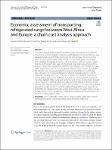Item Infomation
Full metadata record
| DC Field | Value | Language |
|---|---|---|
| dc.contributor.author | Seyed Abolfazl, Mohseni | - |
| dc.contributor.author | Christa, Sys | - |
| dc.contributor.author | Thierry, Vanelslander | - |
| dc.date.accessioned | 2023-05-05T02:01:44Z | - |
| dc.date.available | 2023-05-05T02:01:44Z | - |
| dc.date.issued | 2023 | - |
| dc.identifier.uri | https://link.springer.com/article/10.1186/s41072-023-00136-x | - |
| dc.identifier.uri | https://dlib.phenikaa-uni.edu.vn/handle/PNK/8405 | - |
| dc.description | Cc BY | vi |
| dc.description.abstract | Determining which ports to call at in a maritime loop is considered as an important determinant factor for shipping companies which impacts not only on efficiency, and productivity but also on transportation costs. The port selection process becomes more challenging and sensitive if the market is for perishable goods such as fruits and vegetables. Specifically, this paper aims to develop an efficient maritime supply chain for reefer cargo. A case study of refrigerated cargo trade between West-Africa and West-Europe is investigated for which the main objective is to minimize the trade route's supply chain costs. To do so, the paper analyzes various scenarios based upon the different types of cargo (transshipment and non-transshipment), commodity types (dry and reefer), and a combination of different (un)loading ports in and the Rotterdam–Gibraltar range. Four African ports, namely Tema (Ghana), Douala (Cameroon), Abidjan (Ivory Coast), and Dakar (Senegal), are considered for the outbound leg (Africa–Europe), while several ports in the E.U. and the U.K. are selected as inbound leg. | vi |
| dc.language.iso | en | vi |
| dc.publisher | Springer | vi |
| dc.subject | West-Africa and Europe | vi |
| dc.subject | transporting refrigerated cargo | vi |
| dc.title | Economic assessment of transporting refrigerated cargo between West-Africa and Europe a chain cost analysis approach | vi |
| dc.type | Book | vi |
| Appears in Collections | ||
| OER - Kinh tế và Quản lý | ||
Files in This Item:

